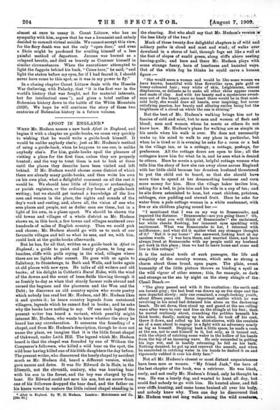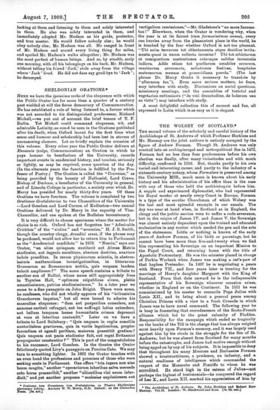AFOOT IN ENGLAND.*
WHEN Mr. Hudson names a new book Afoot in England, and begins it with a chapter on guide-books, we come very quickly to wishing that he would write a guide-hook himself. It would be unlike anybody else's; just as Mr. Hudson's method of using a guide-book, when he happens to use one, is unlike anybody else's. For him, guide-books spoil the pleasure of visiting a place for the first time, unless they are properly treated ; and the way to treat them is not to look at them until the places they describe have been visited and left behind. If Mr. Hudson would choose some district of which there are already many guide-books, and then write his own on his own plan, what a delightful comment on all the rest it would be. We should hear little of history, or archaeology, or parish registers, or the ordinary dry bones of guide-book writing; but we should get instead a knowledge of the live men and women in the place, the sights and sounds of the day's work and resting, and, above all, the vision of one who sees places and people, not as duller men see them, but in a light of his own, in a plane apart. We should be shown the old towns and villages of a whole district as Mr. Hudson shows us, in this book, a few towns and villages scattered over hundreds of miles of English country. Then we could pick and choose; Mr. Hudson should go with us to each of our favourite villages and tell us what he sees, and we, with him, could look at the guide7books afterwards.
But he has, for all that, written us a guide-book in Afoot in England ; a guide to quiet and lonely places, to long sea- beaches, cliffs with gulls crying in the wind, villages where there are no lights after sunset. He goes with us again to Salisbury, to Stonehenge, to Bath and Wells, and looks again at old places with new eyes. He talks of old writers and old books; of his delight in Cobbett's Rural Rides, with the wind of the downs and the scent of bean-fields blowing through it as freshly to-day as when that sturdy farmer rode abroad and cursed the bagmen and the placemen and the Wen and the Debt; be discovers an old country squire who wrote poetry which nobody has read but Mr. Hudson, and Mr. Hudson likes it and quotes it; he bears country legends from untutored villagers, legends which he cannot find in books ; and he asks why the books have nothing to say. Of one such legend the present writer has heard a variant, which possibly might interest Mr. Hudson, who wants to know whether the story be beard has any corroboration. It concerns the founding of a chapel, and from Mr. Hudson's description, though he does not name the place, we imagine that it is the little forest chapel of Oakwood, under Leith Hill. The legend which Mr. Hudson beard is that the chapel was founded by one of William the Conqueror's followers, who killed a wild boar on the spot, the wild boar having killed one of his little daughters the day before. The present writer, who discovered the lonely chapel by accident much as Mr. Hudson did, heard a different version, which gave names and dates. It was Sir Edward de la Hale, in the fifteenth, not the eleventh, century, who was hunting boar with his son in the forest, and the boy was charged by the hoar. Sir Edward could not save his son, but an arrow from one of his followers dropped the boar dead, and the father on his knees vowed to restore the little ruined chapel standing in * Afoot in England. By W, H. Hudson. London: Hutchinson and Co. 110s, 6dj,
the clearing. But who shall say that Mr. Hudson's version is the less likely of the two ?
Much of these twenty-five delightful chapters is of wild and solitary paths in cloud and mist and wind; of walks over
downland in a storm of hail, through fogs set like a wall at the foot of slopes of sunlit green, along oliffe above nesting herring-gulls; and here and there Mr. Hudson plays with some strange fancy, born of loneliness and haunted ways.
Out of the white fog he thinks be could carve a human figure :—
" She would seem a woman and would be like some women we have known, beautiful with blue flowerlike eyes, pale gold or honey-coloured hair ; very white of skin, Leightonian, almost diaphanous, so delicate as to make all other skins appear coarse and made of clay. And with her beauty and a mysterious sweet- ness not of the heart, since no heart there would be in that mist- cold body, she would draw all hearts, ever inspiring, but never satisfying passion, her beauty and alluring smiles being but the brightness of a cloud on which the sun is shining."
But the best of Mr. Hudson's walking brings him not to fancies of cold and mist, but to men and women of flesh and blood; men and women whom be meets as others do not know how. Mr. Hudson's plans for walking are as simple as his needs when his walk is over. He does not necessarily make up his mind to walk to any place in particular, but when he is tired or it is evening he asks for a room or a bed in the village inn, or in a cottage; a cottage, perhaps, for preference. All the cottage doors are open to him ; all the cottagers know him for what he is, and he sees what is denied to others. Here he meets a quiet, helpful cottage woman who tells him the story of how she ran away alone across England with her little child because her drunken husband threatened to put the child out to board, so that she should have
more time to spend at her dressmaking business and earn more money for him. Here the village baker invites him, asking for a bed, to join him and his wife in a cup of tea; and he sits down astonished to ham, hot roast chicken, potatoes, cabbages, rice pudding and stewed fruit. Here he asks for water from a pale cottage woman in a white sunbonnet, with five or six children playing round her :—
"I mentioned that I was on my way to Branscombe, and inquired the distance. Branscombe—are you going there ? Oh, I wonder what you will think of Branscombe !' she exclaimed, her white cheeks flushing, her innocent eyes sparkling with excitement. What was Branscombe to her, I returned with indifference; and what did it matter what any stranger thought of it? 'But it is my home!' she answered, looking hurt at my careless words. 'I was born there, and married there, and have always lived at Branscombe with my people until my husband got work in this place ; then we had to leave home and come au& live in this cottage.'" It is the natural truth of such passages, the life and simplicity of the country woman, which sets so strong a charm about these broad, open pages. The plain, sweet humanity of the little picture throws as binding a spell as. the wild vigour of other scenes; this, for example, as dark. and strange as the sea by night on the steep shingle of the- Chesil Beach :— " The glory passed and with it the exaltation : the earth and sea turned grey ; the last boat was drawn up on the slope and the men departed slowly : only one remained, a rough-looking youth, about fifteen years old. Some important matter which he was revolving in his mind had detained him alone on the darkening- beach. He sat down, then stood up and gazed at the sea rolling wave after wave to roar and hiss on the shingle at his feet; then. he moved restlessly about, crunching the pebbles beneath his thick boots ; finally, making up his mind, he took off his coat,. threw it down, and rolled up his shirt-sleeves, with the resolute- air of a man about to engage in a fight with an adversary nearly as big as himself. Stepping back a little space, he made a rush at the sea, not to cast himself in it, but only, as it turned out,. with the object of catching some water in the hollow of his hands from the top of an incoming wave. Ho only succeeded in getting his legs wet, and in hastily retreating he fell on his back. Nothing daunted, ho got up and renewed the assault, and when be succeeded in catching water in his hands he dashed it on and vigorously rubbed it over his dirty face."
Not all Mr. Hudson's closest or most distant acquaintances have been men or women. "My friend Jack," the hero of the last chapter of the book, was a retriever. He was black, curly, and not really Mr. Hudson's friend, only he thought he was. He was a lonely dog, and wanted to hunt all day, but could find nobody to go with Lim. He hunted alone, and fell . over cliffs hunting, and came home bruised all over his body,- and nobody knew why. Then one day he discovered that Mr. Hudson went out long walks among the wild creatures,. ,
looking at them and listening to them and solely interested in them. He also was solely interested in them, and immediately adopted Mr. Hudson as his guide, protector, and true master. He would follow nobody else ; be would obey nobody else; Mr. Hudson was all. He ranged in front of Mr. Hudson and scared every living thing for miles, and spoiled Mr. Hudson's walks altogether ; Mr. Hudson was the most perfect of human beings. And so, by stealth, early one morning, with all his belongings on his back. Mr. Hudson, without telling his friend 'Jack,' stole away from the village where 'Jack ' lived. He did not dare say good-bye to ' Jack ' ; he decamped.







































 Previous page
Previous page